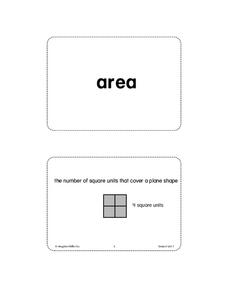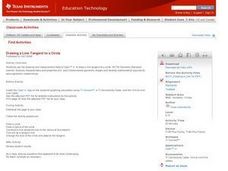Curated OER
Investigating Seasonal Variability in NO2 Concentrations
Students study different formats of data and determine the nitrogen dioxide concentrations. In this seasons lesson students understand the different relationships that NO2 can have.
K12 Reader
The Pitch and Volume of Sound
Primary graders are introduced to the concepts of pitch and volume with a reading comprehension instructional activity that focuses on the physics of sound.
Teach Engineering
Air Under Pressure
Introduce your class to air masses and how they affect the weather with a lesson plan that focuses on the differences between high and low air pressure systems. The class explores actual weather data using archived weather data.
Curated OER
Vocabulary and Concept Development: EDI
The roots metro/meter and therm are the focus of a vocabulary building presentation that includes concise definitions, color-coded examples, and opportunities for guided and independent practice. Part of a series of roots and affixes...
Curated OER
Lesson 1 Activity 1: Tools of the Ancients
Students examine how Christopher Columbus determined his latitude.
Curated OER
Busted Bubbles
Using the scientific method, and bubble gum, learners conduct a motivating experiment. After conducting a series of tests involving bubble gum, they graph and analyze their results. This is the type of activity everyone loves.
Texas Instruments
Properties of Parabolas
Explore the properties of parabolas in this instructional activity. Construct a parabola given a focus and a directrix on the Ti-Nspire. Write equations of parabolas in vertex form and determine the a value of a parabola given a focus...
NOAA
Ground-truthing Satellite Imagery with Drifting Buoy Data
Ground-truthing ... is it even a word? The last installment of a five-part series analyzes how scientists collect sea surface temperature data. Scholars use government websites to compare temperature data collected directly from buoys...
Institute of Electrical and Electronics Engineers
Making Sense of Sensors
Have small groups in your class construct working hygrometers as an example of the benefits of using sensors in engineering. This activity can be used during a weather unit when covering humidity or in a STEM activity as a preparation...
Curated OER
The Voyages of Christopher Columbus Scavenger Hunt
In this Christopher Columbus worksheet, students utilize the Internet to access a specific website to find the answers to eight short answer questions associated with the voyages of Christopher Columbus.
Curated OER
Effects of Ozone Depletion
Explore the causes of ozone depletion and the effect on plankton, algae, plants, amphibians, and humans. Learn how the Montreal Protocol has possibly helped reverse the decline of the ozone layer. Warning: photos of skin and eye...
Curated OER
Understanding Weather
A succinct set of slides covers the main points for your weather unit. From the factors that contribute to conditions, to fronts and extreme occurrences, to the different types of clouds, numerous facts are listed in bullets. The only...
Houghton Mifflin Harcourt
Unit 7 Math Vocabulary Cards (Grade 2)
Reinforce math vocabulary instruction with a set of flash cards. Fifty-six cards offer either a bold-face word or a picture representation equipped with descriptive labels. Terms include centimeters, gallons, square units, and more!...
Chicago Botanic Garden
Weather or Not
What is the difference between weather and climate? This is the focus question of a activity that takes a deeper look at how weather data helps determine climate in a region. Using weather and climate cards, students decide...
NASA
Connecting Models and Critical Questions
Scholars use data to analyze and determine which sets of information need to be counted. They create a model to explain differences among chemical elements using graphs to prove concept mastery.
Texas Instruments
Drawing a Line Tangent to a Circle
Explore lines tangent to a circle. In this math lesson plan, high schoolers manipulate circles and lines on a TI calculator. They draw a circle and analyze perpendicular lines intersecting the circle in only one place. This...
Teach Engineering
Designing a Spectroscopy Mission
In this mind-bending activity, young engineers explore this question of whether or not light actually bends. Using holographic diffraction gratings, groups design and build a spectrograph. The groups then move on research a problem...
Curated OER
Too Heavy For Me
Students explore the different arrangement of air molecules in high and low air pressure masses. They compare the temperature of high and low pressure masses and discover how a barometer works.
Teach Engineering
Edible Rovers
The good thing about building this rover is you get to eat it afterwards. Pairs determine rover parts they want to include in their design based upon their cost and usefulness. The teams design their rovers, build them from edible...
Texas State University
Earth: Deposition and Lithification
Geology geniuses analyze sediment samples with a hand lens and sort according to physical characteristics. They also learn about the processes of cementation, compaction, and lithification within the rock cycle. The lesson plan is...
Curated OER
What are Metamorphic Rocks and How are They Formed?
Even though the student handouts are not included in the write-up, this lesson contains the instructions for terrific activities to use when teaching middle schoolers about metamorphic rocks. First, they compare granite to gneiss and...
Texas Instruments
Finding Linear Models Part III
Explore linear functions! In this Algebra I lesson, mathematicians graph data in a scatter plot and use a graphing calculator to find a linear regression and/or a median-median line. They use the model to make predictions.
wayback.archive.org
Prefixes and Suffixes in Biology Terms
Here is a challenging and cross-curricular worksheet, great for learners in biology or English class. They underline the prefix and/or suffix in each of 15 words and define them. Then, they use their prefix and suffix list to write the...
Curated OER
Weather Challenge
For this identifying the weather terms activity, learners read phrases about the weather and choose the term being described. Students choose 11 multiple choice answers.

























